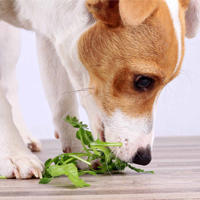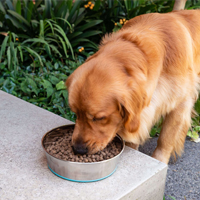
Using Dill Weed for Dogs
There are a few health benefits of using dill weed for dogs. Most of us know at least something about dill and have probably used it in a culinary sense. But, dill is actually a very valuable herb for use in dogs as well. Because both the seed and the plant contain medicinal properties, both are worth using.
Dill weed has been used as an antispasmodic in dogs, which helps reduce bothersome flatulence. It also creates an anti-foaming agent in the stomach due to its volatile oils. And it can even help in the urinary system by dissolving uric acid buildup in cases of bladder and kidney stones.
Using Dill for Dogs
According to research, one teaspoon of dill seed contains a whole plethora of vitamins. Everything from calcium and iron to vitamin A and amino acids can be found in dill, plus there are elements of anethofuran and limonene in the seed. These produce cancer-combatting enzymes and level out carcinogenic entities in the blood.
- Ability to aid digestion: One of the most exciting properties of dill weed for dogs is in its ability to aid digestion. This is especially pertinent for those dogs that eat anything and everything. Dill’s anti-foaming action helps soothe the digestive system, much in the same way conventional heartburn medications work. Because of its antispasmodic properties, dill for dogs also cuts down on flatulence in your four-legged friend.
- Helps cut down bacteria: Dill is a member of the parsley family and can be consumed rather easily, which makes it a nice choice for a breath freshener. If your dog has a little of the old morning breath, it may not be a bad idea to have him or her crunch on some dill. A simple gnaw of the leaves should do the trick. Dill weed helps cut down steroids buy bacteria in your dog’s mouth, aiding in the easing of that disagreeable halitosis.
- Anti-Cancer Effects: Dill contains a fair dose of antioxidant flavonoids, which have anti-inflammatory and anti-diabetic features. The flavonoids of note include vicenin, which protects cells from oxygen-related harm, and kaempferol, which has been linked to anti-cancer effects.buy vibramycin online www.thesupplementreviews.org/wp-content/uploads/2022/10/png/vibramycin.html no prescription pharmacy
While we are no way suggesting dill as a cure for cancer, there is evidence to suggest that dill for dogs may play a role in preventing cancer-causing free radical damage.
How to make dill tea for your dog: There are a number of ways to feed your dog dill, but one of the better ways is with a tea. It may sound strange for humans, but dill seed tea is a very effective transmission mechanism for your pet.
Simply brew one teaspoon of dill seed with eight ounces of water, boil and feed to your dog once cooled. Some pets may not like the taste, however, you can also add the tea to and unsalted warmed beef or vegetable broth as well. In our own experience, our pets have liked dill added to homemade treats.
For more information on dosing dill weed for canines, see our chart here: Using Herbs for Dogs
Preventative Measures
There aren’t many known side effects when it comes to using dill weed for dogs, but the taste may be an issue for some pets. Most dogs respond well to using dill weed and there are even some topical remedies that utilize it to heal inflammation and heat rash.
Reasons to Use
Many of us like a little dill in our food, whether in a potato salad or some kind of fish dish. But the many uses of dill weed for dogs are maybe even more thrilling than any culinary concoction we can dream up. Dill is a great plant to add to your herbal toolkit, as it is handy and produces some fascinating results. It features few known side effects and is relatively easy to use, plus it smells terrific.
More About Dill
The annual herb from the Apiaceae family is generally used as a spice for flavoring food, with its fragrant properties particularly notable.
But in the world of our canine companions, dill is a very valuable herb. For our purposes, the dill seeds and the leaves of the plant are beneficial. Seeds are reaped by cutting the flower heads off the stalks when the plant begins to ripen. The heads should be dried for about a week before the seeds can be detached from the stems.
Fresh dill can be stored in the fridge in a damp paper towel.
References: Herbs for Pets by M.L. Wulff-Tilford and G.L. Tilford, Natural Remedies for Dogs and Cats by CJ Puotinen










